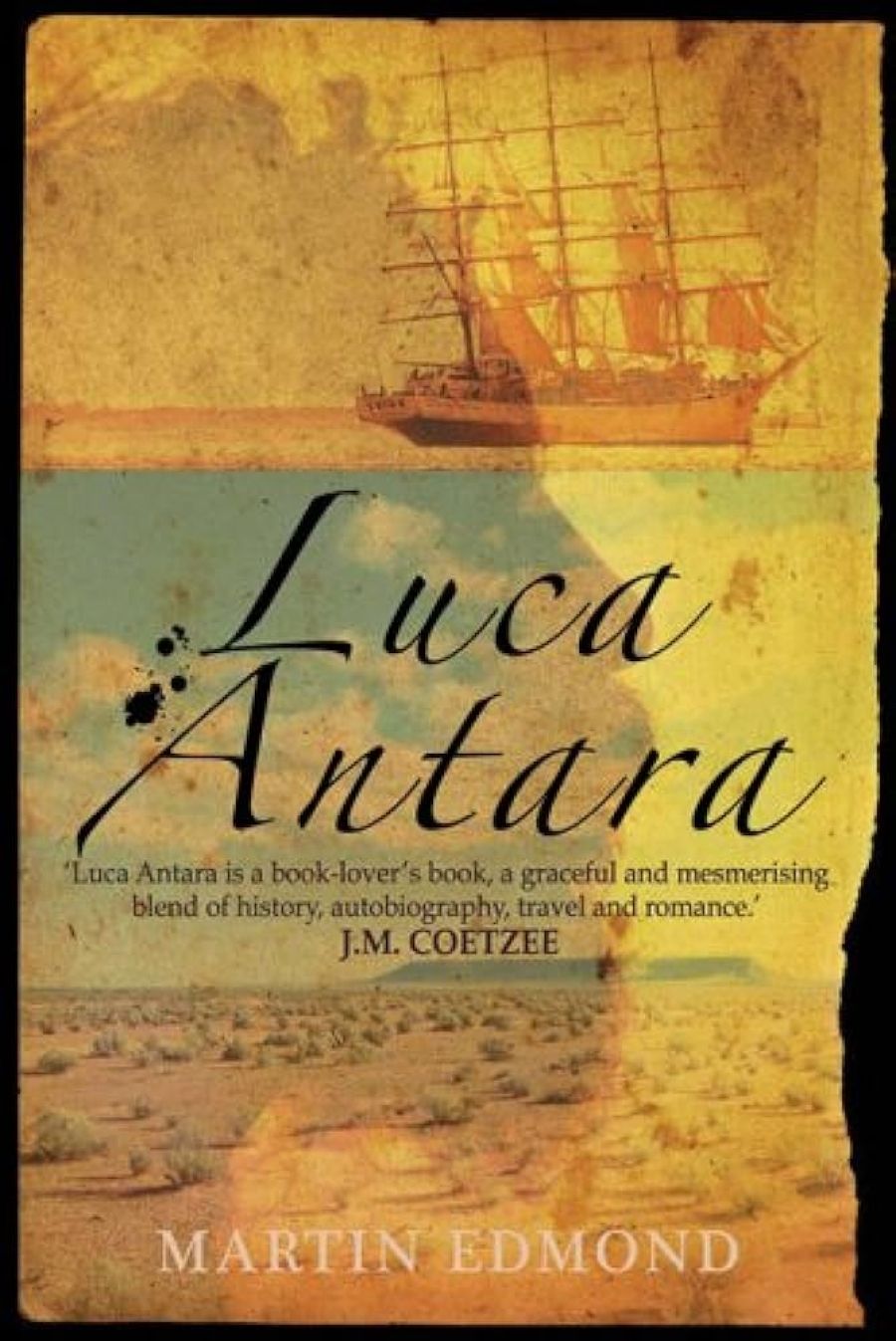
- Free Article: No
- Contents Category: Australian History
- Custom Article Title: Quest junkies
- Review Article: Yes
- Article Title: Quest junkies
- Online Only: No
- Custom Highlight Text:
This novel by New Zealand-born Martin Edmond is difficult to pin down. As I read it, I wondered which genre it belongs to. The narrative moves among various genres, blurring memoir, travelogue, conventional history, reflections upon the internal journeys offered by personal reading, anthropological record, meta-textual fiction as postmodern mystery, even hoax. The unnamed narrator is a professional writer and researcher, thus suggesting an autobiographical element, and his considered reflection on the ‘Ern Malley’ hoax is perhaps the clue to the ‘fiction’ that ultimately engages him; that is, the mysterious document he receives that describes a Portuguese settlement near Darwin in the early seventeenth century.
- Book 1 Title: Luca Antara
- Book 1 Subtitle: Passages in search of Australia
- Book 1 Biblio: East Street Publications, $35 pb, 277 pp, 1741750547
- Book 1 Cover Small (400 x 600):

- Book 1 Cover (800 x 1200):

Luca Antara is flawlessly written and authoritative in its range of reference, all carefully cited. This is impressive, but more than a little daunting when one wants to pursue the central arc of the narrator’s quest. He recounts the texts he reads on his particular interest, Eastern Polynesia, but what I most enjoyed was the realist (anthropological) account of Sydney in the 1980s. Newly arrived in Sydney, the narrator has trained as a taxi driver:
Is there no better way to demystify a city than by becoming one of its taxi cab drivers? I don’t think so. You lose all hope of a gradual unveiling or lingering seduction. There is no luxurious exploring of byways, no odd encounters with the unforeseen around stray corners. You cannot even arrive at an honest appraisal of its authentic charms … Sydney seemed made up of narrow traffic-clotted arteries running between dark ugly façades, behind which were endless suburbs inhabited by pinched working people who transformed at night into desperate pleasure-seekers forever unable to find whatever it was they wanted. I could not believe in the big town’s beauty or terror. There were too many glimpses into too many humdrum lives, too much rital disparagement and abuse by that proportion of fares who treat you as despised servant, too many disappointed drunks complaining violently or sadly after their night out seeking – what? It was better not to ask.
When free to pursue his passion, the narrator haunts antiquarian bookshops in inner Sydney seeking rare books on Eastern Polynesia. In so doing, he describes architectural landmarks in the Sydney of the time. He reads in the city branch of the Sydney Public Library, then situated inside the largely derelict and empty Queen Victoria Building. The history of that building and its transformation into the stylish upmarket shopping complex of today is lovingly detailed. He meets Edward, a quietly defeated bookseller who invites him home to dinner to meet his wife, Mette. With Edward’s collusion, Mette briefly becomes his lover. She craves sexual variety and excitement, but, bizarrely, for the narrator there is no real conversation between them and no relationship other than the sexual.
Sydney in the 1980s is one story; there are many others. The narrative procedure is to evoke the lived experience of the protagonist, which is then juxtaposed against his reading. At the time of Mette, the meta-textual commentary comes from his research into the life of one Jean Cabri and his adventures in the Marquesas – which had a culture that practised wife-sharing – and, incidentally, provided Herman Melville with some of the background for Moby-Dick.
The narrator reads primary sources obsessively and confesses to a fixation on origins, origins of books, origins of countries, origins of cultures:
… [There is] the need to be involved in some kind of mission, to have a puzzle to solve, a mystery to find out about, a quest. A consequence of these several aspects for quest junkies is that no sooner is one accomplished than you are casting around for another to Edward Dorn’s speculation – Is a man / Without a quest / A dangerous sign – I would have to answer yes. Without a quest I become vulnerable to the ever-present temptations of substance abuse, with their inevitable negative consequences; without a quest I become both dangerous to myself and others; without a quest I am prey to ennui, self-loathing and worse. This time I was lucky; in the beguiling labyrinth of McIntyre’s book I found another figure to obsess over, Manoel Godhino de Eredia, the discoverer of the unknown land of Nuca – or Luca – Antara.
The search for the story of Luca Antara is really the narrator’s spiritual quest. The innermost story (Klang’s text) – the tale of the frightening journey of Portuguese da Nova across the Kimberley, led by his indigenous guide and protector, Worri Worri – is compelling, if rather Romantic. He takes him to European people like himself in Marege (Darwin), where an exiled alcoholic Portuguese trades in sea slugs.
This is a very literary novel, crammed with information and speculation on how people live now, and how they lived in the past. It is a pity that the book hasn’t been pruned. Beautiful as it is, it is a little overwhelming.


Comments powered by CComment